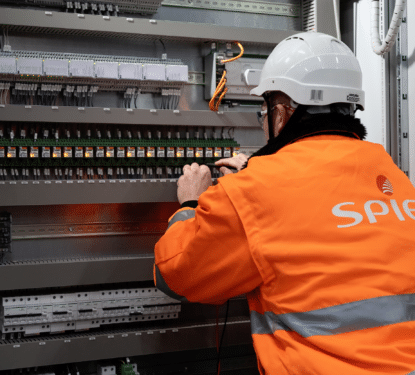To survive the COVID-19 pandemic, society returned to traditional defensive measures; lockdowns, social distancing, plus soap and water. To cope with the crisis, we have embraced the digital world like never before, seamlessly swapping physical for virtual during the social aspects of work and play. To return to “normality,” we will again turn to technology, but this time in the form of contactless and personal control mechanisms to reduce the spread of infection within our shared spaces.
“The default methods of interaction with building equipment and devices may be on the decline due to the emergence of COVID-19. Touchscreens, buttons, cash and credit cards may all soon become technologies of the past as extra vigilant users turn to various forms of contactless interaction and control to minimize the risk of infection,” explains our brand new BIoT report. “Existing and emerging contactless solutions based on a variety of technologies including infra-red sensors, RFID, facial recognition, haptic or voice control should see a significant rise in demand as a result.”
“Contactless” is a term that has become synonymous with NFC-enabled payment methods in developed markets. The challenges of the virus will now accelerate our transition to this technology and the “cashless” future those markets had envisioned happening much later. Cashless won’t be law but between health-driven social pressure to touch less and data-driven motivations of the banking and political sectors to facilitate this transition, it will soon be the norm. Most sentimental or libertarian attachments to physical cash will be overcome, while pin-pads will only serve as a reluctant backup.
The contactless theme will go beyond payment and into access control, via NFC, RFID, Bluetooth or contactless cards, in transport systems and buildings. In an effort to stimulate economic activity, our office buildings will become proving grounds for “hands-free” technology as points of contact between humans and physical surfaces are assessed for alternatives while also being more frequently cleaned. As our new report — The Internet of Things in Smart Commercial Buildings 2020 to 2025 — describes.
“We will see hands-free controls for building devices such as light switches, thermostats, elevators, vending machines, coffee machines, dispensers etc., based on RFID, movement sensors, haptic, smartphone or voice control... smartphone control solutions for elevators developed prior to the pandemic from vendors including Otis, Schindler and Mitsubishi, are expected to attract renewed interest.”
Indeed, since the advent of the virus, Fujitec has already launched a new line of contactless elevator controls that uses an infrared sensor to detect a user's destination floor when they hover their hands over the dashboard. In the future, we should expect more smartphone and voice interfaces for elevators and control systems across the commercial real estate landscape, this may also lead to the accelerated migration of digital assistants from the smart home to the smart building.

“While the widespread adoption of voice control has been largely centered around the smart home environment, the virus should see renewed interest in voice-based technologies for office applications,” the report suggests cautiously. “Challenges including the often-complex acoustic surroundings of a busy office environment, as well as raising potential security concerns over devices’ ability to potentially record or broadcast sensitive commercial conversations will still need to be overcome.”
While these previously established contactless trends are given an unexpected growth boost, other trends are dying. Hotdesking, a form of desk-sharing, which was growing rapidly as a part of the flexible working movement, now seem counterproductive. While co-working spaces may have to fundamentally change their business model, as social interaction, their key selling point that adds the “co-”, becomes the thing everyone is trying to avoid. Our report covered a recent study by the New England Journal of Medicine that found coronavirus on desks for up to 72 hours, and other experts who warn that hot desks can be a hotbed for germs and viruses.
“Many organizations may be tempted to provide temporary desks and hot-desking facilities for the workers that are able to return to office environments when lock-down restrictions are eased, but they should implement flexible working and hot-desking regimes with caution,” warns the report. “In combination with the overall impact on office space demand, the transmissibility of the disease via shared workspaces and peripherals will be bad news for the economic prospects for co-working space providers.”
Due to the economic pressure on political leaders, we were always going to return to our offices too soon, at least from a public health perspective. The plan was never to wait for the virus to disappear completely before opening up again, it was simply to ensure that healthcare systems are not overwhelmed.
Crises force us to adapt and adaptation forces us to evolve, but that evolution is shaped by the challenges we need to overcome. Contactless technology and digital assistants were already growing trends, but so were hotdesking and co-working — the future is what it needs to be, not what we want it to be, and the future is contactless.



